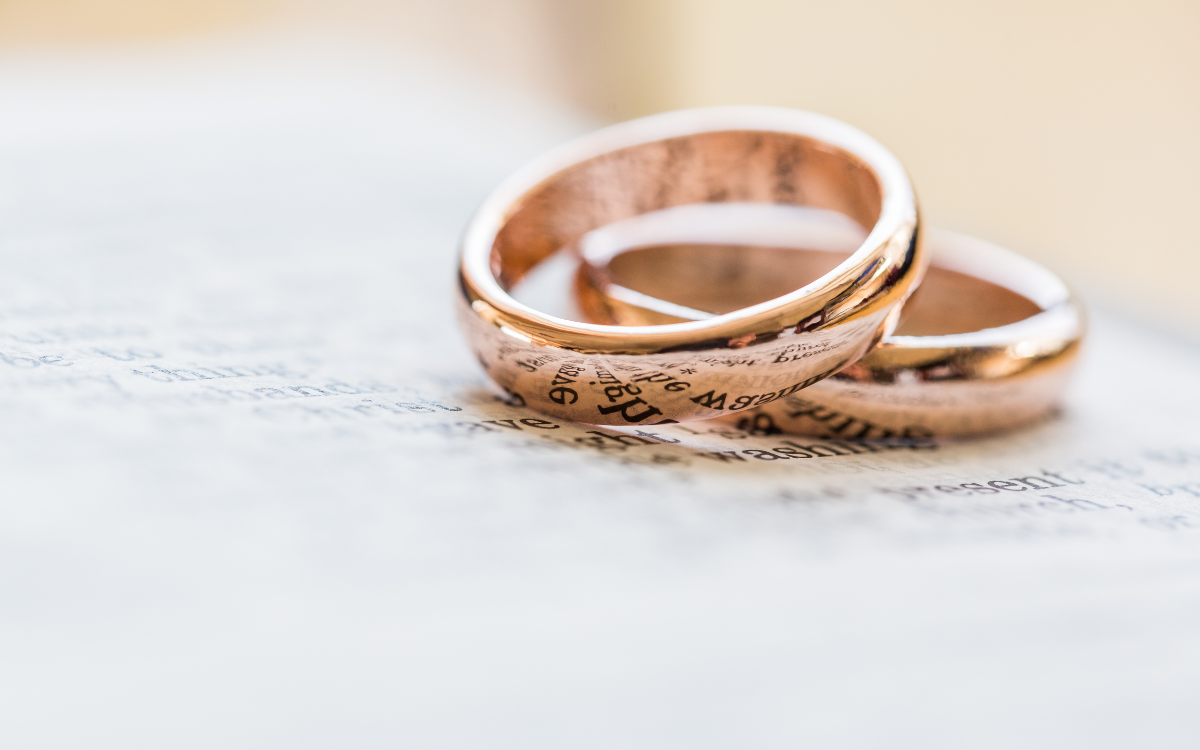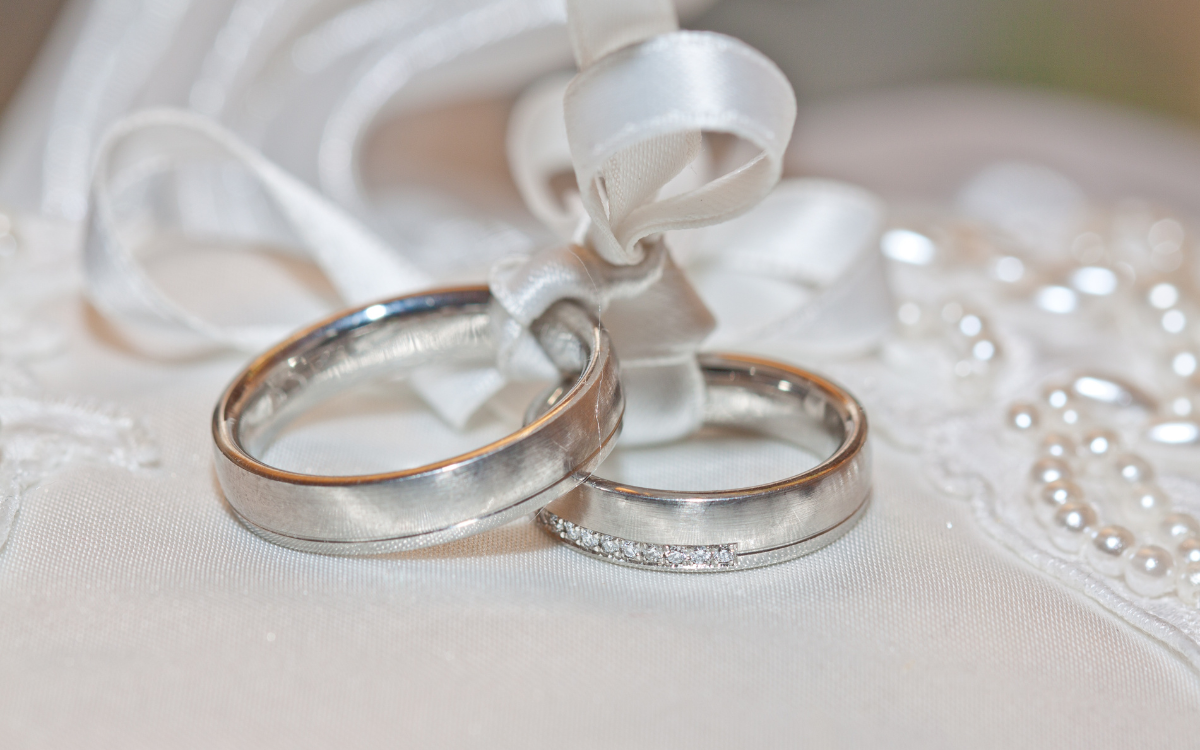Swimming is a great way to stay active and have fun during the hot summer months.
But if you’re married, you may be wondering: can I wear my wedding ring in the pool?
This comprehensive guide tackles that question and other related concerns to help you enjoy the water safely with your ring.
Can Chlorine Damage Your Wedding Ring?

Chlorine, the chemical used to sanitize most pools, can potentially cause damage to precious metals over time. The good news is that occasional swimming with your ring is unlikely to harm it.
However, frequent or prolonged exposure to chlorinated water may dull or corrode wedding bands made of softer metals like gold over time. Those with rings made of platinum or tungsten are less prone to damage. To play it safe, consider removing your ring before lengthy swims in the pool.
Does Salt Water Affect Wedding Rings?
Similar to chlorine, salt water can potentially damage wedding rings with prolonged exposure. The salt and other minerals present in ocean water can cause corrosion, pits, and scratches on softer precious metals over time. Platinum or tungsten wedding bands are more resistant.
For short swims in the ocean, your ring should be fine. But for frequent beach trips or snorkeling excursions, it’s safer to remove your ring for the duration to prevent long-term damage from the saltwater. A simple way to remember – if you need sunscreen for your beach day, your ring needs to come off too.
What Metals Are Safest for Swimming Pools?
When it comes to choosing a wedding ring that can withstand the pool, some metals fare better than others. Platinum and tungsten carbide are excellent choices as they are highly resistant to chlorine corrosion. These hard metals will maintain their luster and shape over years of swimming.
Titanium wedding bands are also a good option. While softer than platinum or tungsten, titanium has better corrosion resistance than gold or silver. Stainless steel rings are affordable and chlorine-resistant too. The least suitable metals for frequent pool use are sterling silver and gold alloys. Extended exposure to chlorine can pit and tarnish these soft precious metals.
Vermeil rings with gold plating over sterling silver are also not ideal for swimming. Ultimately, opt for your wedding ring in a hard, high-quality metal if you want to keep wearing it in the pool.
Storing Rings While Swimming

Once you’ve removed your rings before swimming, you’ll need a safe place to keep them. Some pool facilities may have small lockers available to store valuables. Just be sure to have a quarter or token handy to operate the locker.
Another option is to give your rings to a trusted friend or family member who can watch them poolside. For privacy, place rings in a small pouch or bag before handing them over. If you have a waterproof swim bag, an inner pocket or compartment can securely hold rings.
Some people prefer keeping their rings on their person while swimming. A necklace chain threaded through the rings lets you wear them around your neck. Waterproof silicone rings are made specifically for swimming and water activities. Just take care not to lose silicone rings, as they can be hard to spot at the pool bottom.
With a few simple precautions, you can keep your rings secure while still enjoying a refreshing swim.
Cleaning Rings After Swimming
After a swim, thoroughly clean your rings to remove any pool chemicals, sweat, or dirt. Use a soft toothbrush and mild soap to gently scrub rings under warm running water. Pay special attention to intricate engravings or gemstone settings where gunk can collect.
For extra shine, make a cleaning paste with baking soda and water and use a soft cloth to buff. Rinse rings well after cleaning. Pat dry with a lint-free cloth. If rings need a deeper clean, use a jewelry cleaning solution made specifically for the metal type.
Avoid harsh household cleaners that can damage rings. For extra protection, apply a jewelry polishing cloth after cleaning. Properly caring for rings prevents damage and keeps them looking their best. With some simple post-swim cleaning steps, your rings will come out of the pool looking beautiful.
Expert Tips for Protecting Rings in Pools

When wearing rings swimming, take precautions to prevent damage or loss. Apply clear nail polish on the bottom edges of softer metal rings like gold to prevent scratching the pool surface. Tighten ring prongs and check for loose stones beforehand so nothing dislodges in the water.
For extra security, wear a silicone ring cover over your band while swimming. Silicone protects the surface and provides grip. If concerned about rings falling off, wear them on a necklace instead of your finger when swimming.
Store rings safely in a waterproof container on the pool deck rather than leaving them in locker rooms. Knowing some simple tips will let you confidently keep rings on in the pool without worry. Protect your special rings from harm while still enjoying wearing them for a swim.
Most Durable Wedding Ring Materials
When selecting a sturdy wedding ring, consider metals like platinum, tungsten, titanium, and cobalt chrome.
- Platinum is one of the strongest precious metals, highly resistant to scratches and damage.
- Tungsten rings are also extremely hard, rating higher on the durability scale than both gold and platinum.
- Titanium is feather-light yet industrial grade, known for its toughness and scratch resistance.
- Cobalt chrome is hypoallergenic while also being a modern metal alloy acclaimed for strength.
Alternatives to Wearing Rings Swimming
If you’re concerned about damaging or losing your ring while swimming, consider these options:
- Leave it at home or in a secure place like a locker when heading to the pool or beach. This ensures it stays safe and protected.
- Wear a silicon band instead. Silicone rings are affordable, flexible, and designed for active lifestyles. They provide a worry-free alternative.
- String your ring on a necklace and wear it around your neck when swimming. This keeps the ring close while preventing wear and tear from water exposure.
- Place your ring in a small zippered pouch designed to hold valuables, then safety pin the pouch inside your swimsuit. This allows you to keep your ring secure on your person.
- Invest in a waterproof case to protect your ring when swimming. Look for a secure case that can withstand water pressure.
The pool or ocean doesn’t have to mean parting with your wedding ring. With a little creativity, you can find a comfortable option that lets you keep your ring close while staying protected.
People Also Asked (FAQs)
Should I take my wedding ring off in the pool?
It’s generally recommended to remove your wedding ring before swimming, as the chemicals and abrasive surfaces in pools can damage the metal and stones over time. Taking it off prevents scratching and helps keep your ring looking its best.
How do you protect your rings when swimming?
If you don’t want to remove your rings before swimming, coat them with clear nail polish, which creates a protective barrier against chemicals and friction. You can also purchase special jewelry gloves made of silicone or neoprene to wear in the water. Storing rings in a waterproof case is another option.
Does pool water damage jewelry?
Yes, pool water can potentially damage jewelry over time. The chemicals like chlorine can pit and erode precious metals. Pool surfaces and other abrasive objects can also scratch jewelry if contact is made.
Does chlorine hurt rings?
Chlorine can damage and discolor precious metals in rings over time. The chemicals may pit or corrode metals like gold, silver and platinum. Stones like diamonds can also become loose or fall out after prolonged exposure to pool chemicals.
Conclusion
While you can technically wear your wedding ring in the pool, it’s best to remove rings and other fine jewelry before swimming. If you’re wondering “can I wear my wedding ring in the pool,” consider that pool chemicals like chlorine, and the abrasive surfaces found in pools, can potentially scratch, pit, discolor, and damage precious metals and stones over time. For those who don’t want to remove their rings, using protective measures like clear nail polish, jewelry gloves, or waterproof cases can help safeguard rings from damage. Being mindful about removing your wedding ring before getting in the pool will help ensure it stays in beautiful condition for years to come.

